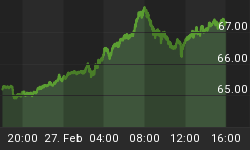The following is part of Pivotal Events that was published for our subscribers September 23, 2010.
Signs Of The Times
Last Year:
"The Fed will fight deflation, and knows how to do that."
- John Mauldin, September 12, 2009
Probably with the only tool it has, which is currency depreciation.
"Obama lashes out at Wall Street"
"The old ways that led to this crisis cannot stand. History cannot be allowed to repeat itself."
- AFP, September 14, 2009
"The Archbishop of Canterbury says that bankers should repent over their mistakes which led to a global financial crisis, but fears that the industry is returning to business as usual."
Indeed, recklessness is back, and the archbishop's sentiments continued with:
"We haven't heard people saying 'well, actually we got it wrong and the whole fundamental principal on which we worked was unreal, was empty.'"
- AP, September 15, 2009
Amen to that!
* * * * *
This Year:
"State Sen. Dave Luechtefeld was in session in Springfield, Illinois when he got a call from the secretary in his district office. She was calling from a cell phone because the district office phones, which are paid by the state, had been disconnected for nonpayment."
- stltoday.com, September 3, 2010
"The Boston Tea Party was protesting abuse of power. This [protest] is now trading public power for the abuse of private power."
- Bill Clinton, AP, September 15, 2010
Mr. Clinton should take a lesson in high-school civics. Especially about the constitutional limits to those in pursuit of unlimited government.
"In our view, they [central banks] will therefore only ease far enough to prevent a negative spiral."
- CSR Research, September 16, 2010
Ever since 1913 admirers of central banks have always assumed perfect policy and implementation. In the mid-1960s interventionists economists boasted that the down part of the business cycle had been eliminated. But, for those who were there - they had a bear market anyway.
The problem has been that the Fed has shown little timing skills on the notion of supplying liquidity when needed and then taking it back when not needed. If they had any implementing skills there would have been no loss of purchasing power of the dollar. That it has given up 96 percent is irrefutable testament to a massive failure.
The real problem of central banking has been, that while the concept has been appealing, it has been corrupted by the chronic need to fund ambitious government through currency depreciation.
However, some change seems to be happening:
"Vicious cuts." "Savage cuts." "Swinging cuts."
"And the British love it. Not only is austerity being touted as the solution to Britain's economic woes, it is also being described as the answer to the country's moral failings."
- National Post, September 20, 2010
Of course, part of the "moral failings" has been central banking and it is difficult to decide if it has been a sin of commission or of omission.
* * * * *
INTEREST RATES
The long bond bounced off support at the 130 level and has made it to 133. A test of the 136.84 high set in late August has been expected and could run to the 134 level.
The stock market is now vulnerable and the popular view has been that weakness could drive the bond price beyond the last high. However, the last surge registered and Upside Exhaustion on the 10-year which suggests it would difficult to get much beyond the last high.
As noted last week, if the test fails the next target is around 125.
Bullish sentiment is well-recorded in the media - to the point that the action has been called a bubble. Although stock markets get most of the attention by the press in real time and by historians in retrospective time, debt has always been "bubbled" during a great financial mania.
This time around there have been a number of facets to the action. Sub-prime mortgage bonds began to fail in early 2007, and corporate bonds later in that fateful year. The latter crashed in 2008 and sovereign debt began to fail in 2009.
On the sequence this leaves the long treasury market vulnerable to a loss of liquidity.
When?
Don't know, but the Democrats have been abusing everything in an almost unprecedented manner. The economy and the treasury market won't be able to handle it and the market's rejection of the abuse will be interesting.
Enjoying the "sunshine", corporates behaved well with declining yields and narrowing spreads until Monday. A little of the opposite has been happening since--including this morning.
It seems that Friday and Monday also set the best for the S&P, Nasdaq, Dax, FTSE and base metal prices. Going the other way, the long bond set its low price on Friday.
Time will tell when the change that has been possible is accomplished.
CURRENCIES
As mentioned above, the Fed's renewal of its pledge to depreciate the dollar drove it down 79.6 on Wednesday. This is likely a test of the technically correct low set in early August.
It may take some days to get the change in, but the next item will be a firming dollar.
The Canadian dollar is taking another run at the 98 level, but as mentioned last week this represents considerable resistance. There is little on the upside and should passions diminish for commodities, the C$ could decline to the 93 level.
AMUSEMENT DEPARTMENT:
Although Beyond The Fringe dates from 1962 the sketch "The End of World" can be dedicated to today's terminally anxious crowd of "Global Warmers", or whatever the latest rallying call is: http://www.youtube.com/watch?v=lSZ2by7M9NI
Link to September 24, 2010 'Bob and Phil Show on Howestreet.com: http://www.howestreet.com/index.php?pl=/goldradio/index.php/mediaplayer/1782















